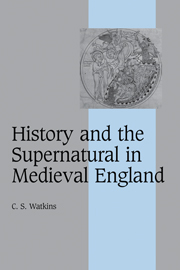Book contents
- Frontmatter
- Contents
- Preface
- Note on the text
- List of abbreviations
- INTRODUCTION
- Chapter 1 THINKING ABOUT THE SUPERNATURAL
- Chapter 2 INVENTING PAGANS
- Chapter 3 PRAYERS, SPELLS AND SAINTS
- Chapter 4 SPECIAL POWERS AND MAGICAL ARTS
- Chapter 5 IMAGINING THE DEAD
- Chapter 6 THINKING WITH THE SUPERNATURAL
- CONCLUSION
- Bibliography
- Index
- Cambridge Studies in Medieval Life and Thought Fourth Series
Chapter 4 - SPECIAL POWERS AND MAGICAL ARTS
Published online by Cambridge University Press: 23 June 2009
- Frontmatter
- Contents
- Preface
- Note on the text
- List of abbreviations
- INTRODUCTION
- Chapter 1 THINKING ABOUT THE SUPERNATURAL
- Chapter 2 INVENTING PAGANS
- Chapter 3 PRAYERS, SPELLS AND SAINTS
- Chapter 4 SPECIAL POWERS AND MAGICAL ARTS
- Chapter 5 IMAGINING THE DEAD
- Chapter 6 THINKING WITH THE SUPERNATURAL
- CONCLUSION
- Bibliography
- Index
- Cambridge Studies in Medieval Life and Thought Fourth Series
Summary
We saw in chapter 2 that ‘paganism’ was dead as a social reality and vanishing even as a fear haunting clerical imaginations. But new kinds of alarm agitated many churchmen who wrote historical narratives in the long twelfth century. As pagans disappeared, magicians and necromancers loomed large, perhaps larger than ever, in clerical condemnations. Why might this be? The social realities of magic in the middle ages are notoriously difficult to penetrate but there are reasons external to the practice of the art which magnified official apprehensions. In twelfth-century representations of magic three fears converged. First, magic was frequently thought to involve the dangerous instrumentalisation of Christian rituals, gestures, utterances and substances in the service of worldly ambitions. Necromancers were believed, for example, to use crucifix, holy water, signing with the cross and scriptural texts to help them command devils. Such manipulation stretched to an extreme the idea, already encountered in chapter 3, that holy things worked by intrinsic power, but here this was turned to purposes wholly antithetical to the demands of faith.
Secondly, fear of magic was also stimulated by new intellectual developments. Bodies of knowledge dealing the ‘properties of things’ and astrology might hold a dangerous fascination for those susceptible to their promise of advantage. These arts had the capacity to distract, entangle in vain speculation or divert from religious obligations.
- Type
- Chapter
- Information
- History and the Supernatural in Medieval England , pp. 129 - 169Publisher: Cambridge University PressPrint publication year: 2007

